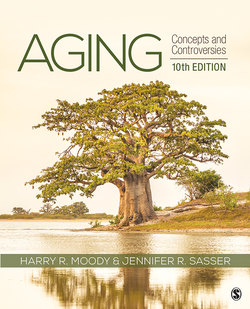Читать книгу Aging - Harry R. Moody - Страница 63
На сайте Литреса книга снята с продажи.
Reading 3: Vital Involvement in Old Age
ОглавлениеErik H. Erikson, Joan M. Erikson, and Helen Q. Kivnick
Elders have both less and more. Unlike the infant, the elder has a reservoir of strength in the wellsprings of history and storytelling. As collectors of time and preservers of memory, those healthy elders who have survived into a reasonably fit old age have time on their side—time that is to be dispensed wisely and creatively, usually in the form of stories, to those younger ones who will one day follow in their footsteps. Telling these stories, and telling them well, marks a certain capacity for one generation to entrust itself to the next, by passing on a certain shared and collective identity to the survivors of the next generation: the future. Trust … is one of the constant human values or virtues, universally acknowledged as basic for all relationships. Hope is yet another basic foundation for all community living and for survival itself, from infancy to old age. The question of old age, and perhaps of life, is how—with the trust and competency accumulated in old age—one adapts to and makes peace with the inevitable physical disintegration of aging.
After years of collaboration, elders should be able to know and trust, and know when to mistrust, not only their own senses and physical capacities, but also their accumulated knowledge of the world around them. It is important to listen to the authoritative and objective voices of professionals with an open mind, but one’s own judgment, after all those years of intimate relations with the body and with others, is decisive. The ultimate capacities of the aging person are not yet determined. The future may well bring surprises.
Elders, of course, know well their own strengths. They should keep all of these strengths in use and involved in whatever their environment offers or makes possible. And they should not underestimate the possibility of developing strengths that are still dormant. Taking part in needed and useful work is appropriate for both elders and their relationship to the community.
With aging, there are inevitably constant losses—losses of those very close, and friends near and far. Those who have been rich in intimacy also have the most to lose. Recollection is one form of adaptation, but the effort skillfully to form new relationships is adaptive and more rewarding. Old age is necessarily a time of relinquishing—of giving up old friends, old roles, earlier work that was once meaningful, and even possessions that belong to a previous stage of life and are now an impediment to the resiliency and freedom that seem to be requisite for adapting to the unknown challenges that determine the final stage of life.
Trust in interdependence. Give and accept help when it is needed. Old Oedipus well knew that the aged sometimes need three legs; pride can be an asset but not a cane.
When frailty takes over, dependence is appropriate, and one has no choice but to trust in the compassion of others and be consistently surprised at how faithful some caretakers can be.
Much living, however, can teach us only how little is known. Accept that essential “notknowingness” of childhood and with it also that playful curiosity. Growing old can be an interesting adventure and is certainly full of surprises.
One is reminded here of the image Hindu philosophy uses to describe the final letting go—that of merely being. The mother cat picks up in her mouth the kitten, which completely collapses every tension and hangs limp and infinitely trusting in the maternal benevolence. The kitten responds instinctively. We human beings require at least a whole lifetime of practice to do this. The religious traditions of the world reflect these concerns and provide them with substance and form.
